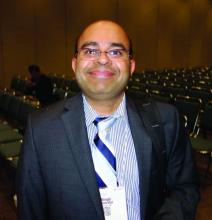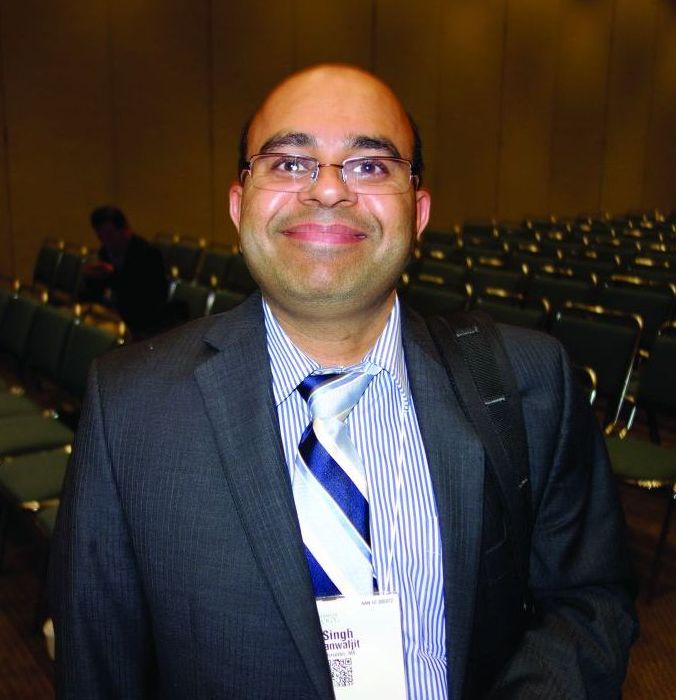User login
LOS ANGELES –
Sulforaphane is a compound in cruciferous vegetables, especially 3-day-old broccoli sprouts. It’s sold widely online and in stores, often as broccoli sprout extract, for anticancer and other effects.
The idea of using it for autism came about after investigators noticed that, in the lab, it induced some of the cellular changes associated with fever, including upregulation of heat shock proteins, according to Kanwaljit Singh, MD, a pediatrics instructor at the University of Massachusetts, Worcester.
Fever has been reported to improve autism symptoms. So, several years ago, “we decided to do a pilot study with sulforaphane” to see if it had a similar effect, Dr. Singh said at the annual meeting of the American Academy of Neurology.
At 18 weeks, 29 young autistic men randomized to the supplement outperformed 15 randomized to placebo on the Aberrant Behavior Checklist and other measures. It was the first study of sulforaphane for autism, and it got a good deal of press attention when it was published in 2014; Dr. Singh was the lead author (Proc Natl Acad Sci U S A. 2014 Oct 28;111[43]:15550-5).
“Because we had a very good signal in our pilot study, we decided to do a slightly larger, slightly more complex clinical trial, which is ongoing right now,” he said. The results aren’t due until the second half of 2018, but he gave an interim report at the meeting.
There are 50 children with autism in the new study, aged 3-12 years. Half are randomized to sulforaphane, half to placebo, for the first 15 weeks, then all are switched to open-label sulforaphane for 15 weeks more, followed by a 6-week washout period.
The randomized portion is still blinded. But so far, 31% have responded positively at 15 weeks, meaning a much or very much improved score in at least two domains on the Ohio Autism Clinical Global Impressions Scale; domains cover social interaction, violent behavior, communication, and other areas.
Among the patients who have completed the study, the response rate at week 30 almost doubled, to 56%. “We don’t know which patients were on sulforaphane and which were on placebo” in the randomized phase, Dr. Singh said. “But we think because the response doubled” when the second half of the children were switched to sulforaphane, “there should probably not be a very large placebo effect here.”
Meanwhile, after the washout period, “some patients still do well, but many more [go] back to baseline,” added Dr. Singh, the senior investigator in the new trial.
The most common side effects are insomnia (28%), vomiting (19%), flatulence (17%), diarrhea (15%), and constipation (13%). A few patients have dropped out because of insomnia and diarrhea; more have dropped out because they simply didn’t want to take the pills – 125 mg of broccoli seed powder three to eight times a day, depending on weight.
Other groups are looking into sulforaphane, too – not just for autism, but also for schizophrenia, prostate cancer, and other indications.
The U.S. Department of Defense is funding the research. The investigators said they have no relevant disclosures.
SOURCE: Zimmerman A et al. Neurology. 2018 Apr 22; 90(15 Suppl.):N1.002.
LOS ANGELES –
Sulforaphane is a compound in cruciferous vegetables, especially 3-day-old broccoli sprouts. It’s sold widely online and in stores, often as broccoli sprout extract, for anticancer and other effects.
The idea of using it for autism came about after investigators noticed that, in the lab, it induced some of the cellular changes associated with fever, including upregulation of heat shock proteins, according to Kanwaljit Singh, MD, a pediatrics instructor at the University of Massachusetts, Worcester.
Fever has been reported to improve autism symptoms. So, several years ago, “we decided to do a pilot study with sulforaphane” to see if it had a similar effect, Dr. Singh said at the annual meeting of the American Academy of Neurology.
At 18 weeks, 29 young autistic men randomized to the supplement outperformed 15 randomized to placebo on the Aberrant Behavior Checklist and other measures. It was the first study of sulforaphane for autism, and it got a good deal of press attention when it was published in 2014; Dr. Singh was the lead author (Proc Natl Acad Sci U S A. 2014 Oct 28;111[43]:15550-5).
“Because we had a very good signal in our pilot study, we decided to do a slightly larger, slightly more complex clinical trial, which is ongoing right now,” he said. The results aren’t due until the second half of 2018, but he gave an interim report at the meeting.
There are 50 children with autism in the new study, aged 3-12 years. Half are randomized to sulforaphane, half to placebo, for the first 15 weeks, then all are switched to open-label sulforaphane for 15 weeks more, followed by a 6-week washout period.
The randomized portion is still blinded. But so far, 31% have responded positively at 15 weeks, meaning a much or very much improved score in at least two domains on the Ohio Autism Clinical Global Impressions Scale; domains cover social interaction, violent behavior, communication, and other areas.
Among the patients who have completed the study, the response rate at week 30 almost doubled, to 56%. “We don’t know which patients were on sulforaphane and which were on placebo” in the randomized phase, Dr. Singh said. “But we think because the response doubled” when the second half of the children were switched to sulforaphane, “there should probably not be a very large placebo effect here.”
Meanwhile, after the washout period, “some patients still do well, but many more [go] back to baseline,” added Dr. Singh, the senior investigator in the new trial.
The most common side effects are insomnia (28%), vomiting (19%), flatulence (17%), diarrhea (15%), and constipation (13%). A few patients have dropped out because of insomnia and diarrhea; more have dropped out because they simply didn’t want to take the pills – 125 mg of broccoli seed powder three to eight times a day, depending on weight.
Other groups are looking into sulforaphane, too – not just for autism, but also for schizophrenia, prostate cancer, and other indications.
The U.S. Department of Defense is funding the research. The investigators said they have no relevant disclosures.
SOURCE: Zimmerman A et al. Neurology. 2018 Apr 22; 90(15 Suppl.):N1.002.
LOS ANGELES –
Sulforaphane is a compound in cruciferous vegetables, especially 3-day-old broccoli sprouts. It’s sold widely online and in stores, often as broccoli sprout extract, for anticancer and other effects.
The idea of using it for autism came about after investigators noticed that, in the lab, it induced some of the cellular changes associated with fever, including upregulation of heat shock proteins, according to Kanwaljit Singh, MD, a pediatrics instructor at the University of Massachusetts, Worcester.
Fever has been reported to improve autism symptoms. So, several years ago, “we decided to do a pilot study with sulforaphane” to see if it had a similar effect, Dr. Singh said at the annual meeting of the American Academy of Neurology.
At 18 weeks, 29 young autistic men randomized to the supplement outperformed 15 randomized to placebo on the Aberrant Behavior Checklist and other measures. It was the first study of sulforaphane for autism, and it got a good deal of press attention when it was published in 2014; Dr. Singh was the lead author (Proc Natl Acad Sci U S A. 2014 Oct 28;111[43]:15550-5).
“Because we had a very good signal in our pilot study, we decided to do a slightly larger, slightly more complex clinical trial, which is ongoing right now,” he said. The results aren’t due until the second half of 2018, but he gave an interim report at the meeting.
There are 50 children with autism in the new study, aged 3-12 years. Half are randomized to sulforaphane, half to placebo, for the first 15 weeks, then all are switched to open-label sulforaphane for 15 weeks more, followed by a 6-week washout period.
The randomized portion is still blinded. But so far, 31% have responded positively at 15 weeks, meaning a much or very much improved score in at least two domains on the Ohio Autism Clinical Global Impressions Scale; domains cover social interaction, violent behavior, communication, and other areas.
Among the patients who have completed the study, the response rate at week 30 almost doubled, to 56%. “We don’t know which patients were on sulforaphane and which were on placebo” in the randomized phase, Dr. Singh said. “But we think because the response doubled” when the second half of the children were switched to sulforaphane, “there should probably not be a very large placebo effect here.”
Meanwhile, after the washout period, “some patients still do well, but many more [go] back to baseline,” added Dr. Singh, the senior investigator in the new trial.
The most common side effects are insomnia (28%), vomiting (19%), flatulence (17%), diarrhea (15%), and constipation (13%). A few patients have dropped out because of insomnia and diarrhea; more have dropped out because they simply didn’t want to take the pills – 125 mg of broccoli seed powder three to eight times a day, depending on weight.
Other groups are looking into sulforaphane, too – not just for autism, but also for schizophrenia, prostate cancer, and other indications.
The U.S. Department of Defense is funding the research. The investigators said they have no relevant disclosures.
SOURCE: Zimmerman A et al. Neurology. 2018 Apr 22; 90(15 Suppl.):N1.002.
REPORTING FROM AAN 2018
Key clinical point: The dietary supplement is showing benefit in an ongoing trial, but there are a lot of pills.
Major finding: The response rate at 30 weeks was 56%.
Study details: A randomized trial involving 50 children with autism.
Disclosures: The U.S. Department of Defense is funding the research. The investigators said they have no relevant disclosures.
Source: Zimmerman A et al. Neurology. 2018 Apr;90(15 Suppl.):N1.002.

